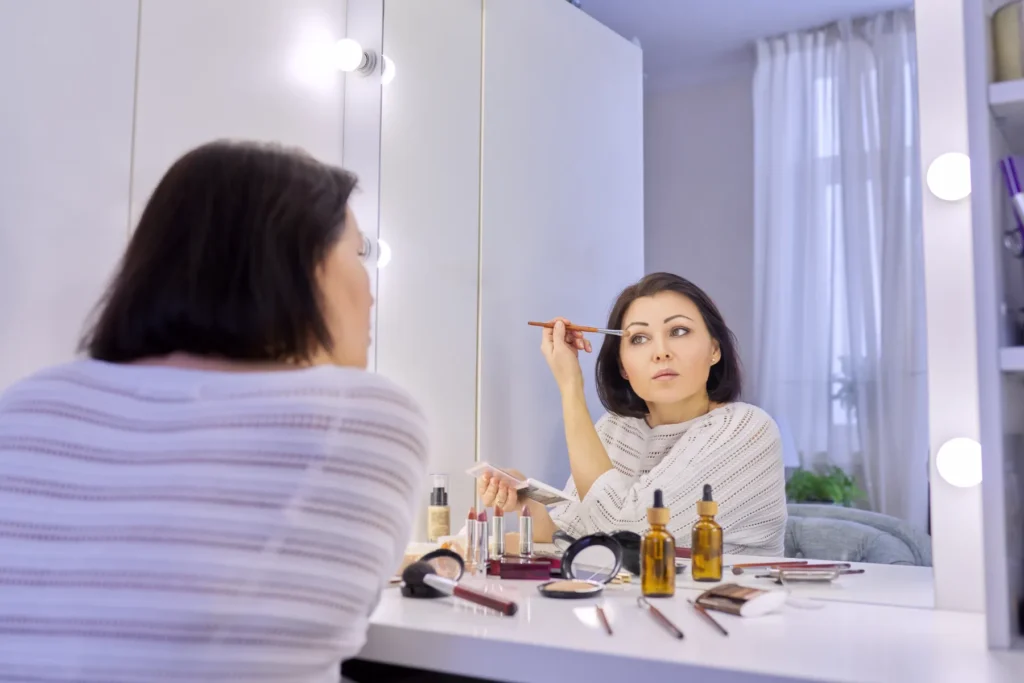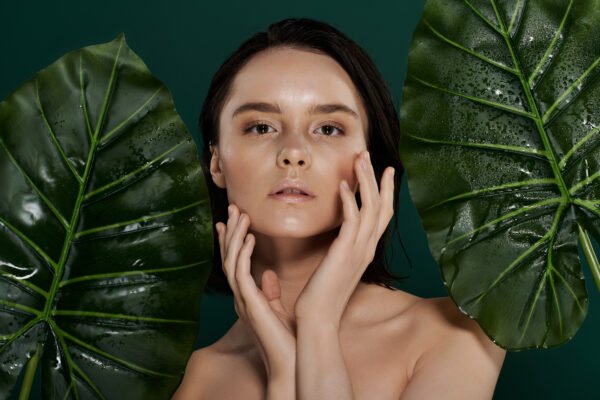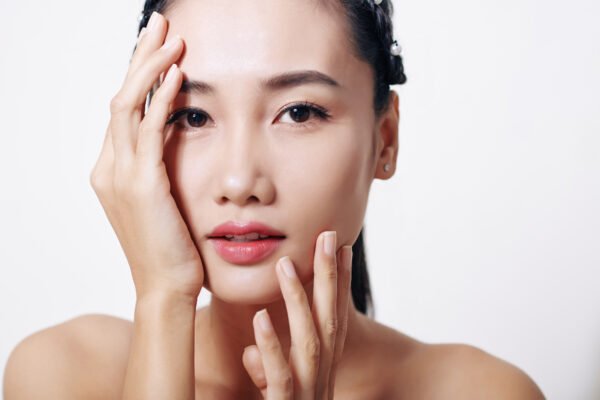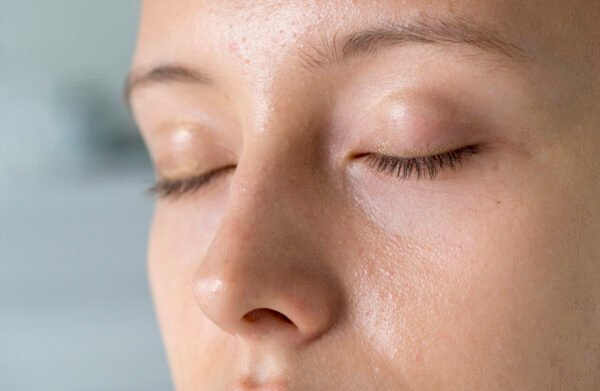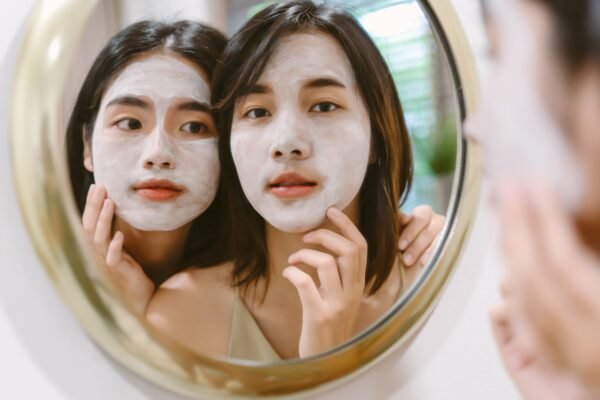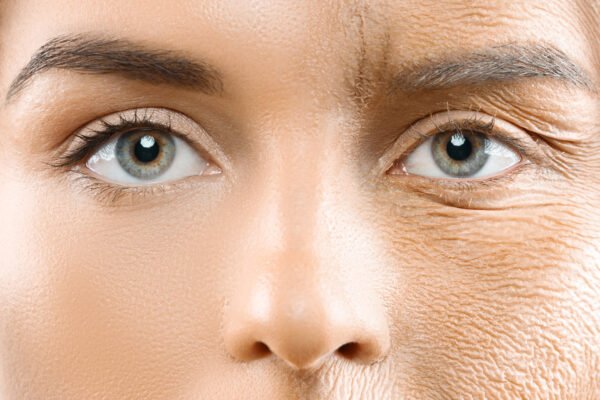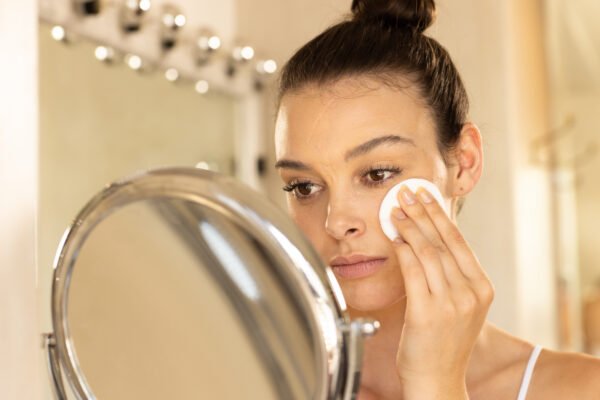Introduction
Welcome to the eternal beauty fountain. This site will help you appear youthful forever. In a world where every wrinkle has a tale, here is an in-depth look at skincare for aged skin. Join us as we transcend beauty and appreciate the wisdom and beauty of ageing. We’ll help you create a skincare program that improves your skin and mood.
Understanding Aging Skin
Intrinsic and Extrinsic Factors:
Both internal and external factors can cause skin to age. Intrinsic factors like genes control the natural ageing process. Extrinsic factors, like sun exposure and lifestyle choices, cause visible signs of ageing.
Genetic Impact:
A big part of how our genes determine our skin ages. Genetics determines skin thickness, elasticity, and how likely someone is to show specific signs of age.
Extrinsic Influences:
Spending a lot of time in the sun, smoking, and not eating well can speed up ageing. To keep your face healthy, you need to understand and lessen these effects.
Visible Signs:
Aging skin often shows wrinkles, fine lines, and less suppleness. These changes happen because collagen and elastin fibres break down, affecting the face’s structure and appearance.
Collagen and Elastin:
Elastin lets the skin stretch and return to its original shape, while collagen gives the skin its shape. Our bodies make fewer proteins as we age, shrinking and wrinkling our skin.
Loss of Hydration:
Skin that is getting older likes to lose water, which makes it dry and dull. Staying hydrated is essential for fighting the apparent signs of ageing.
Cell Turnover:
As we age, our body’s normal cell turnover process slows down. This makes dead skin cells build up. Using exfoliation as part of your skincare practice helps your cells renew, which makes your skin look younger.
Building a Solid Skincare Routine
Cleansing:
Cleaning your face is the first step in a good skincare practice. Cleanse your face with a mild cleaner to get rid of dirt, oil, and makeup without drying out your skin.
Exfoliation:
Exfoliation must be done regularly for cell change to occur. This process helps remove dead skin cells, making the face look younger and healthier. Pick exfoliants that are good for your skin type.
Hydration:
Staying adequately hydrated is the key to keeping your face looking young. Use a hydrating toner or essence to restore wetness to the skin and get it ready for the next step.
Moisturization:
Use a moisturizer that is right for your skin type to keep it fresh. Moisturizers help keep skin flexible, preventing it from drying out and reducing the look of fine lines.
Serums and Treatments:
Add serums with retinoids, vitamin C, hyaluronic acid, or other active ingredients to your routine. These unique treatments help with problems like dry skin, fine lines, and uneven skin tone.
Eye Cream:
Pay extra attention to the sensitive skin around your eyes. Use an eye cream to keep your eyes moist, reduce puffiness, and make fine lines and wrinkles look less noticeable.
Sunscreen:
Protecting yourself from the sun is a must. Make sure the sunscreen you choose has at least SPF 30, and put it on every morning, even if it’s cloudy. This protects the face from UV rays, slowing the ageing process.
Day and Night Routine:
Make sure your face care routine works for both day and night. The day is about keeping things safe, and the night is about healing and growing back. In the evening, use items like retinoids or peptides.
Sun Protection: A Vital Step
UV Radiation and Aging:
The sun is a big reason people age faster than they should. UV radiation speeds up the breakdown of collagen and elastic fibres, which causes wrinkles, sagging skin, and uneven skin tone.
Daily Application of Sunscreen:
Sunscreen is an essential part of any skincare practice. Use a broad-spectrum sunscreen with at least SPF 30 every morning, even on cloudy days. This keeps UVA and UVB rays from hitting the skin.
Sunscreen Types:
Choose a sunscreen that is suitable for your skin type. Options include chemical (organic) sunscreens with active components like avobenzone or octocrylene and mineral (physical) sunscreens with zinc oxide or titanium dioxide.
Reapplication:
Put on more sunscreen every two hours, especially if you’re outside or doing water-related activities. This keeps you safe from the sun’s harmful effects all day.
Sun Protection Beyond Summer:
Sun safety is important throughout the year. UV rays are very dangerous and can damage things even when it’s cloudy outside. Always put on sunscreen, no matter the season.
Anti-Aging Ingredients to Look For
Retinoids (Vitamin A Derivatives):
Retinoids, including retinol and tretinoin, are vital ingredients that increase collagen production, smooth out fine lines, and help the skin renew itself. Start with smaller concentrations to minimize irritation.
Hyaluronic Acid:
Hyaluronic acid is a powerful moisturizer that draws in and holds onto water in the skin. This makes the skin plumper and less wrinkled. It can be used on many types of skin, even sensitive skin.
Vitamin C (Ascorbic Acid):
Free radicals from UV light can damage skin, but vitamin C is a potent antioxidant that helps protect it. It makes the skin look brighter, helps the body produce more collagen, and eliminates dark spots.
Peptides:
Peptides are amino acids that help the body make collagen, making skin rigid and flexible. They can target specific problems, like getting rid of wrinkles.
Niacinamide (Vitamin B3):
Niacinamide is a flexible ingredient that works well for various skin types. It is known to help reduce inflammation, improve skin suppleness, and control oil production.
Alpha Hydroxy Acids (AHAs):
AHAs, such as glycolic and lactic acid, remove dead skin cells from the skin’s surface. They help eliminate fine lines, make the skin feel better, and make other anti-ageing ingredients work better.
Beta Hydroxy Acids (BHAs):
A popular BHA called salicylic acid helps oily skin prone to acne. It removes dead skin cells inside the pores, which clears up the skin and makes it smoother.
Lifestyle Habits for Youthful Skin
Balanced Diet:
A food full of nutrients is essential for keeping skin looking young. Eat plenty of fruits, veggies, lean proteins, and omega-3 fatty acids for healthy skin.
Hydration:
Staying adequately hydrated is essential for keeping your face flexible and glowing. Aim to drink at least eight glasses of water daily, but this can change depending on your needs and activity.
Limit Sugar and Processed Foods:
Too much sugar and processed foods can worsen inflammation and speed up ageing. To keep your skin healthy, choose whole, raw foods.
Antioxidant-Rich Foods:
Eat foods high in antioxidants, like nuts, berries, and fresh greens. Antioxidants fight free radicals and help you look younger and healthier.
Regular Exercise:
Being active improves blood flow, bringing oxygen and nutrients to the face. Also, exercise can help lower stress, which is good for the skin’s health.
Adequate Sleep:
Getting enough good sleep is essential for face repair and regeneration. To keep your skin looking young, try to get between 7 and 9 hours of sleep every night.
Specialized Treatments for Aged Skin
Facials:
Deep cleaning, scrubbing, and using specific serums can all be part of professional facials for older skin. These methods help the skin look younger and take care of particular problems.
Chemical Peels:
After a chemical peel, an acid solution is used to remove the top layer of skin. This process can make your face smoother, eliminate fine lines, and make you look younger.
Microdermabrasion:
During this noninvasive treatment, a machine gently removes the top layer of skin. This speeds up cell turnover and helps with problems like fine lines, sun damage, and mild scarring.
Laser Therapy:
Laser treatments can help with problems like sunspots, lines, and uneven skin tone. Several kinds of lasers are used to improve the skin’s general texture and increase collagen production.
Microneedling:
Microneedling includes making tiny holes in the skin to help topical treatments work better and boost collagen production. It can smooth out your face and make fine lines less noticeable.
Injectables (Botox and Dermal Fillers):
Botox injections briefly loosen up muscles, which makes dynamic wrinkles look less noticeable. Dermal fillers add volume to areas that have lost it, smoothing out lines and making the face look better.
Customized Skincare Tips for Different Skin Types
Dry Skin:
Use a gentle and moisturizing cleanser to keep natural oils on your skin.
Use a thick, soothing moisturizer with hyaluronic acid and other chemicals.
To make the skin barrier stronger, use items with ceramides.
Hydrating sheet masks can add even more wetness to your skin.
Oily Skin:
Choose a cleaner that foams or gels to get rid of extra oil.
To keep your skin moist without clogging pores, use lotions that aren’t oil-based or comedogenic.
For light exfoliation and oil control, use salicylic acid or glycolic acid.
Clay masks can help get rid of shine and extra oil.
Combination Skin:
To clean dry and oily skin, use a light, well-balanced cleanser.
If you have oily skin, use a gel-based moisturizer. If you have dry skin, use a thicker one.
Apply lighter products to areas that are oily and more moisturizing products to areas that are dry.
Sensitive Skin:
Choose hypoallergenic items that don’t have any scents to avoid irritation.
Patch-test new goods to see if they cause allergies before they are widely used.
To reduce the chance of reactions, stick to a simple routine with fewer goods.
Chamomile, aloe vera, and marigold are all ingredients that can help you feel better.
Acne-Prone Skin:
Pick a cleaner with salicylic acid to clear your pores and prevent acne.
To prevent acne from worsening, use oil-free creams that your pores and prevent acne from using benzoyl peroxide or retinoids that you put on the skin.
To keep scars from forming, don’t pick at or squeeze spots.
Mature or Aging Skin:
Anti-ageing chemicals like hyaluronic acid, retinoids, and peptides should be added.
To fight free radical damage, use a lotion that is rich in antioxidants and good for your skin.
Think about treatments that boost collagen, like retinol or items that contain collagen.
Sunscreen with an SPF of 30 or higher is essential to keep your skin from ageing.
Normal Skin:
Enjoy having the freedom to try out different skincare items.
Use a gentle wash, moisturizer, and sunscreen daily to keep your routine in check.
Exfoliants like alpha hydroxy acids (AHAs) or beta hydroxy acids (BHAs) should occasionally be used for deep cleaning.
Change your procedure based on the time of year and any skin problems you have.
Embracing Natural Remedies
Coconut Oil:
Use coconut oil to moisturize your skin and give it a healthy glow.
Use a small amount as an overnight treatment to keep your skin extra moist.
Honey:
Use honey’s natural ability to kill germs to treat acne and keep it from returning.
Mix honey with yoghurt or avocado to make a mask that will keep your skin moist.
Aloe Vera:
Aloe vera juice can help soothe skin that is irritated or sunburned.
Use aloe vera to help your body heal and reduce swelling.
Tea Tree Oil:
Tea tree oil can help with acne and other skin problems by killing germs.
Mix with a carrier oil and only lightly apply to the places that need it.
Choosing the Right Products
When choosing the right skin care products, you must consider your skin type, worries, and how well the ingredients work together. Ensure that the soaps, moisturizers, and treatments suit your skin type. To fight aging, look for goods with beneficial ingredients like hyaluronic acid, retinoids, and antioxidants. For best results, check your routine often and make changes based on what your face needs.
Maintaining Consistency for Lasting Results
When it comes to skincare, consistency is critical. Stick to your plan for results that last. When you use items regularly, the active ingredients have a chance to do their job, which leads to healthier skin over time. Setting up a routine helps with specific issues and guarantees long-term rewards. Take time to care for yourself, and your skin will show it with a healthy, glowing look.
Conclusion
In the search for skincare that fights aging, the trip is a complete mix of science, nature, and self-care. Knowing how your skin changes as you age and making your routine are two things that will help you stay beautiful for a long time. When we use natural remedies, specialized treatments, and the right products, we start a journey honing the knowledge of our skin.
When we care for our faces regularly, we fight to age and build a radiant, confident spirit that lasts forever. Accept that changing is beautiful, and let your skincare routine show you how to love yourself.

